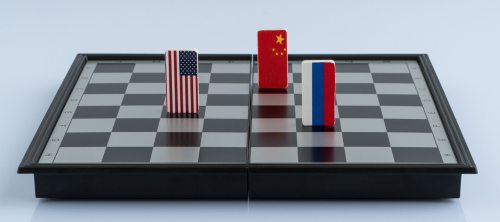China and the US escalate a war of words over Taiwan and regional dominance following Defense Secretary Pete Hegseth’s combative speech at the Shangri-La Dialogue in Singapore. China’s Foreign Ministry accused Hegseth of promoting a “cold war mentality” and making defamatory allegations Tensions over Taiwan have escalated, with both countries increasing their military presence in the South China Sea. Despite efforts to lower tariffs, ongoing trade disputes continue to strain US-China relations.
Diplomatic Clash at Shangri-La Dialogue
A heated exchange erupted between the United States and China at the recent Shangri-La Dialogue in Singapore, further escalating tensions between the world’s two largest economies. Defense Secretary Pete Hegseth delivered remarks characterizing China as a potential “imminent threat” to security in the Indo-Pacific region, drawing swift and stern rebuke from Beijing. The confrontation highlights the deepening divide between the two nations as President Trump’s administration takes a more assertive stance toward Chinese military expansion and economic practices.
Great speech by SECDEF, he called the CCP an imminent danger to democracies in Asia. Now we should explicitly & publically grow our tools to combat the CCP & support Taiwan – bilat exercises, the Joint Training Team & the Taiwan Security Coop Initiativehttps://t.co/XlaHaGaIRG
— Mark Montgomery (@MarkCMontgomery) June 2, 2025
China’s Foreign Ministry immediately fired back, accusing Hegseth of espousing a “cold war mentality” and making defamatory allegations against China. Chinese Defense Ministry spokesperson Zhang Xiaogang called Hegseth’s comments a clear provocation that deliberately distorted China’s policy positions. The diplomatic clash underscores the increasingly fragile state of US-China relations amid rising competition for influence in the strategically vital Indo-Pacific region.
Taiwan Remains Central Flashpoint
The status of Taiwan continues to be the most volatile issue in US-China relations. During his address, Hegseth specifically called out China’s behavior toward the self-governing island, stating bluntly, “China seeks to intimidate you in your own waters. China’s military harasses Taiwan.” His comments reflect growing concern in Washington about Beijing’s increasingly aggressive military posturing around Taiwan, which China considers a breakaway province that must eventually be reunified with the mainland, by force if necessary.
Sec Def Pete Hegseth gave a speech in which he calls China a real and imminent threat to Taiwan and the region surrounding. Former diversity hire secdef Loyd Austin would never have said that. The Biden regime was bought by China and bought Ukraine. Trump is owned by no one. pic.twitter.com/KshjRXQUXN
— Zebra12🇺🇲⚡🔥 sic semper tyrannis ☀️Molon Labe (@Zebra12991210) May 31, 2025
“We do not seek regime change, nor will we instigate or disrespect a proud and historic culture. We will be ready, but we will not be reckless. Instead, we seek peace. But we must ensure that China cannot dominate us—or our allies and partners.” – Pete Hegseth
China has consistently maintained that Taiwan is strictly an internal affair and bristles at any foreign interference. Following Hegseth’s remarks, China’s Foreign Ministry doubled down on this position, asserting that the US is undermining peace in the Asia-Pacific region through its support for Taiwan. While the United States does not officially recognize Taiwan diplomatically, it remains the island’s most important international backer and arms supplier, providing military equipment for Taiwan’s self-defense capabilities.
Economic Tensions Compound Military Rivalry
Beyond military posturing, economic disputes continue to strain US-China relations. Despite some recent efforts to ease trade tensions, negotiations to lower tariffs have stalled. President Trump has accused China of violating trade agreements, while China has criticized US export controls in the semiconductor sector as unfair restrictions designed to hobble China’s technological advancement. The economic dimension adds another layer of complexity to an already fraught relationship.
Despite the heated rhetoric, Treasury Secretary Scott Bessent has expressed confidence in resolving trade issues between President Trump and Chinese President Xi Jinping. Meanwhile, some American business leaders, including JPMorgan Chase CEO Jamie Dimon, have suggested that the United States should focus more on addressing internal challenges rather than viewing China as its greatest threat. The debate reflects varying perspectives within American political and business circles about how to manage the increasingly competitive relationship with China.
New Approach to Indo-Pacific Security
Hegseth’s comments at the Shangri-La Dialogue also revealed the Trump administration’s evolving approach to regional security arrangements. The Defense Secretary urged Indo-Pacific allies to contribute more to their own defense, indicating the need for “tough conversations” about burden-sharing. This message aligns with President Trump’s long-standing position that American allies should take greater responsibility for their security rather than relying primarily on US military protection.
Adding to bilateral tensions, Secretary of State Marco Rubio has announced plans to revoke visas for Chinese students linked to the Chinese Communist Party or studying in critical fields. This move signals a hardening stance on educational and cultural exchanges, historically considered important bridges between the two nations. The comprehensive nature of US-China competition—spanning military, economic, technological, and now educational spheres—illustrates how deeply entrenched the rivalry has become across all domains of international relations.

